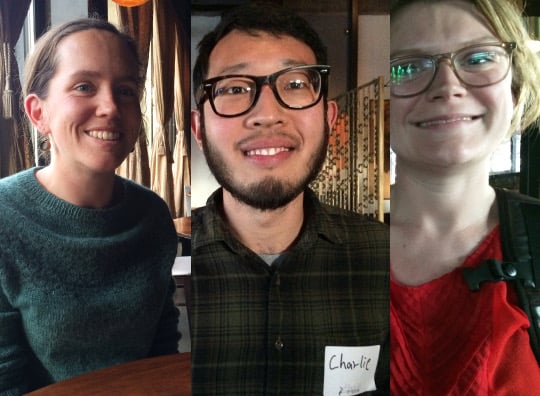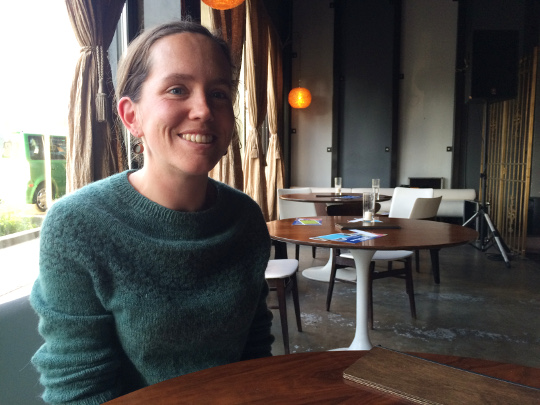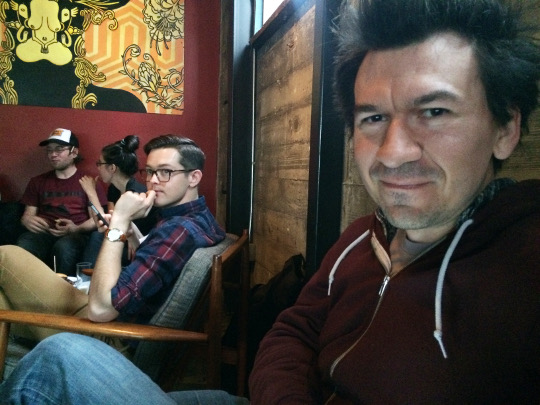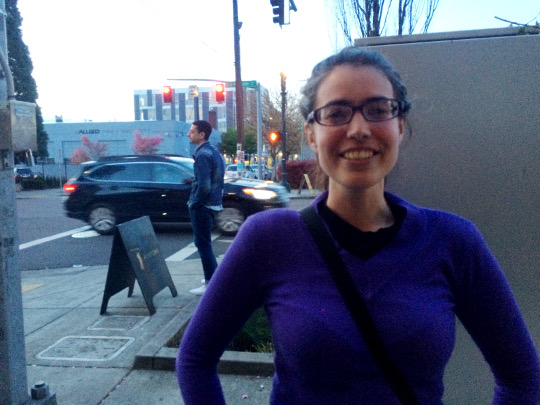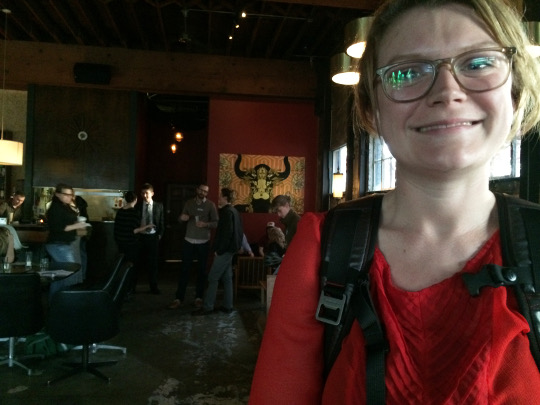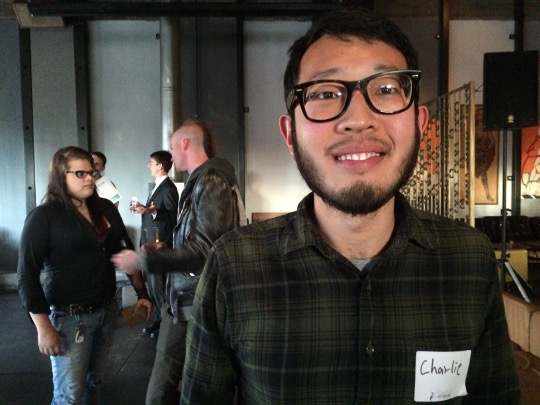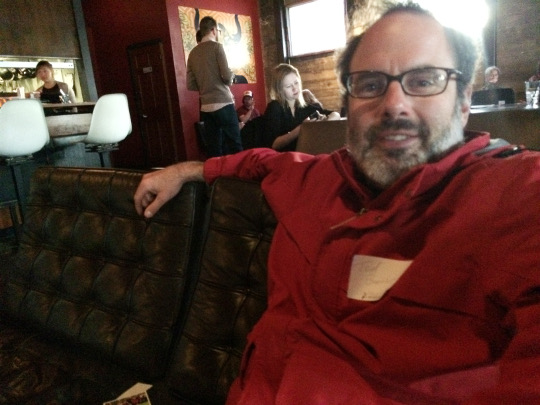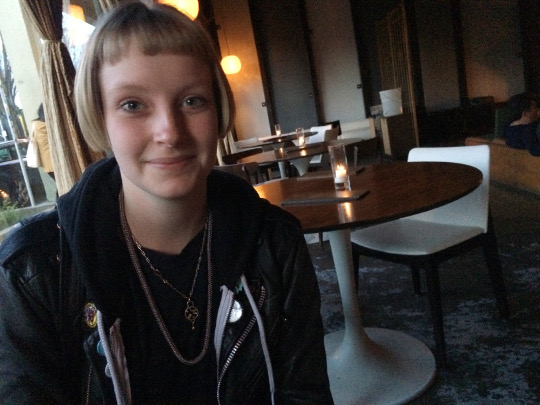Six Portland mayoral candidates sounded off on transportation issues Monday night in the first (and possibly the only) event of the 2016 election season to focus exclusively on transportation.
Hosted by the Portland chapter of Young Professionals in Transportation, the event drew candidates Deborah Harris, Jules Bailey, Jessie Sponberg, Sean Davis, David Schor and Bim Ditson.
Ted Wheeler, by far the best-funded candidate and one of the clear frontrunners, didn’t make it. Sarah Iannarone, who with Wheeler and Bailey is one of the three candidates who have raised enough money for a dedicated campaign staff, initially RSVP’d but didn’t turn up for the forum either.
Iannarone wrote online Tuesday that “as a single, working mom and candidate, sometimes I have scheduling conflicts beyond my control.” Monday night on Twitter, Wheeler offered to field questions digitally. (See below.)
But we also came to the debate wanting to hear from some important players in this election that BikePortland hasn’t yet interviewed many of: voters.
So after the event, we talked to seven attendees to get a few thoughts the debate, the candidates, and the race so far.
Kristin Sweeney
Sweeney said she lives in North Portland, near Lombard and Mississippi, and commutes by bike across the Columbia River to East Vancouver three days a week. The proposal from several candidates — Schor, Sponberg and Ditson — that bike traffic should be carried by a “parallel network” away from main streets caught her attention.
“The whole parallel network idea is interesting to me,” she said. “It would be nice if it happened. But it doesn’t seem like it’s going to happen.”
She wants candidates to be proposing ideas that would more immediately improve the city — including helping change the way people think about bikes.
“Just today I had a sort of heated discussion with someone who left the door open in the bike lane,” she said. “Honestly, the thing that makes me feel unsafe is that I assume people are angry at me.”
Patrick Rafferty
Rafferty said he’d been following BikePortland’s interviews and that it was too bad Iannarone had been absent.
“Sarah seems like my girl, I think,” he said. “She’s thinking really big, I think — bigger than most. .. Portland is great. But the way it got great is by thinking big.”
Rafferty said he was a little surprised that Iannarone was promising to move toward a car-free area downtown within 10 years rather than within her first four-year term.
“She’s not thinking unreasonably big,” he concluded.
Rafferty aded that he also thinks Wheeler, Shor and Bailey are “fine” and that Ditson seemed to be running the campaign that he wished Bailey were running.
“They’re all fine except Sponberg,” Rafferty said.
Lale Santelices
Santelices, a program staffer for the Community Cycling Center (where she is, among other things, a coordinator for the family bike-fun club Andando en Bicicletas en Cully) said that as a noncitizen immigrant from Chile, she’s not a voter. But she’s very active in local issues and engaged in the race.
She was talking with Ditson when I approached, and said she had liked what he had to say. She also expressed warmth toward Harris, noting that she is a woman of color on a stage dominated by white men. Still, she said she felt let down by all the candidates.
“I am not very impressed,” she said. “Everyone was trying to let me know that they’re bikers too. Fuck that! I don’t want you to be a biker if you haven’t biked. … You don’t need to be a biker to have empathy for biking.”
“If anybody had said that, I would have been like, ‘yes!'”
Laura Krull
“I thought Jules did a good job and I thought assistant attorney general [Schor] did a good job,” Krull said.
Charlie Tso
“I felt there was a little bit of dodging the question, I wish they would have been a little more straightforward,” said Tso. “I think Jules was knowledgeable on a lot of this but I don’t know if he came across as someone who was willing to stand up.”
Tso said he wished Iannarone had attended.
“I really wish Sarah had been here,” he said. “She’s the one I’ll vote for. She’s the one who I think understands the fundamental issues.”
Ted Buehler
Buehler is one of the co-chairs of activist group BikeLoudPDX. He said he’s fully undecided in the mayoral race, and Monday’s debate hadn’t changed that.
“When somebody hits the mayoral seat, they have a certain amount of political capital that they can burn on specific projects,” he said. “And since I think transportation is our most pressing concern, bicycles in particular, I want to hear them saying that they’re going to push for bicyclists.”
On the other hand, Buehler said, “I think the bicycle constituency is strongest when it’s seen as a swing voter bloc.” Buehler said that when former Mayor Sam Adams was caught lying about his sexual relationship with a young aide, he knew that biking supporters were in his base and he had to burn all his political capital supporting other groups.
“So I suppose that I’m happy that more of them aren’t really pushing bicycles too much,” Buehler said.
He added that he realized this was a contradictory set of opinions.
Jodie Beechem
Beechem thoughtfully disclosed up front that she’s Ditson’s girlfriend and plans to vote for him. But she was happy to share further thoughts.
“I thought everybody did well,” she said. “It seemed like everybody was on the same page.”
Besides Ditson, she said, she “really likes” Davis and Schor.
Advertisement
So what was said at the debate? For those of us who’ve been following their past statements, the candidates didn’t break a lot of new ground. That’s actually a good sign for transportation policy: even without transportation-focused debates, every candidate on the stage has received enough of these questions before to know the language of the issues fairly well and have a well-developed set of positions.
.@juleskbailey's Vision Zero position: need $$ to spend on sidewalks, protected bike lanes, diverters. Plugs @fixpdxstreets gas tax plan.
— BikePortland (@BikePortland) April 5, 2016
.@ozone2016's Vision Zero plan: keep bikes off big streets, set 10 mph speed limit on side streets.
Hmm.
— BikePortland (@BikePortland) April 5, 2016
“Ozone” is Sponberg’s Twitter handle.
.@davidschor and @bimditson add to the calls for "parallel routes" for bikes off major streets as a Vision Zero policy.
— BikePortland (@BikePortland) April 5, 2016
.@juleskbailey also calls it "crazy" that Oregon constitution bans gas taxes from being spent on public transit.
— BikePortland (@BikePortland) April 5, 2016
.@davidschor says one of the best things Portland can do for biking is boost "secure, covered bike parking"
— BikePortland (@BikePortland) April 5, 2016
To me (though, OK, I’m biased) the most striking thing about the debate was that every single candidate present signed on to some aspect of the so-called Shoupian view of auto parking: that if people have to pay a market rate for the cost of the space their cars require, the whole transportation system will work better.
Next Q: How can we use parking policy to get city down to 43% driving by 2035?
— BikePortland (@BikePortland) April 5, 2016
Deborah Harris tells the secret to getting more convenient parking: higher parking prices! Spoiler: this is true.
— BikePortland (@BikePortland) April 5, 2016
(Harris mentioned the statistic, first cited by parking economist Donald Shoup, that something like 30 percent of congested downtown traffic consists of people circling the block for parking spaces, at least in some cities.)
.@ozone2016 on parking policy: "no more publicly subsidized parking. meters everywhere. Eff your car."
— BikePortland (@BikePortland) April 5, 2016
.@originalseanD: "any money we spend to build more parking structures is money wasted. it's money we spend on the past."
— BikePortland (@BikePortland) April 5, 2016
.@davidschor: parking downtown must be expensive enough to give people an incentive to take transit.
— BikePortland (@BikePortland) April 5, 2016
The number of mayoral candidates who just said exactly what transpo reformers would want them to say about parking was really remarkable.
— BikePortland (@BikePortland) April 5, 2016
The next question was also about transportation economics: decongestion pricing. Already in use in Singapore, Stockholm and London, the idea is that charging people to drive on busy streets during the busiest hours helps the system run more efficiently by shifting nonessential auto trips to other modes or times. The usual proposal is to use that toll money to improve public transit and active transportation, which makes it easier for people to avoid the decongestion charge by using a mode that doesn’t increase congestion for everyone else.
Next question: Do you support pricing our roadways to reduce congestion? @yptportland not avoiding the big questions here.
— BikePortland (@BikePortland) April 5, 2016
I didn’t get Bailey’s response on Twitter, but the former professional transportation economist endorsed this concept Monday, as he had in our interview last month.
.@bimditson says "the only way" to "bridge the massive gap in infrastructure funding that we have" is to "toll the roads."
— BikePortland (@BikePortland) April 5, 2016
If I got that right, @ozone2016 wants a "progressive gas tax" that charges people more by income.
— BikePortland (@BikePortland) April 5, 2016
.@davidschor and @BimDitson support congestion pricing with an exception or lower rate if you're poor.
— BikePortland (@BikePortland) April 5, 2016
.@sarahforpdx and @tedwheeler are getting out of a lot of tough questions by missing this event. Next Q: dedicated bus lane on Powell?
— BikePortland (@BikePortland) April 5, 2016
.@juleskbailey says he's for BRT but doesn't answer the question of whether he'd back a bus lane on Powell. Gets boos from a few folks.
— BikePortland (@BikePortland) April 5, 2016
.@davidschor If we spend millions on BRT and bus times don't improve, that gets in way of more BRT.
— BikePortland (@BikePortland) April 5, 2016
As I said above, Iannarone (who did get to Rontom’s about 30 minutes after the debate wrapped up and talked with people there) and Wheeler both made efforts to share thoughts on Twitter. On Tuesday Iannarone retweeted this Twitter user’s answer to the parking question:
Simultaneous demand based pricing, decoupling of parking from housing, transit infrastructure, + active transportation @BikePortland
— Claudia Preciado (@Claudia_Pres) April 5, 2016
And added:
What can I add @BikePortland? For-profit district parking near transit? 'In lieu of' fees? @DonaldShoup on speedial? https://t.co/Oe2ls5zrDU
— Sarah Iannarone (@sarahforpdx) April 5, 2016
On bus rapid transit:
1/2 BRT is essentially useless w/o dedicated ROW between city center and 82nd. https://t.co/3aJ74AYIAL
— Sarah Iannarone (@sarahforpdx) April 5, 2016
2/2 Priority w Powell BRT should be community concerns E of 82nd: walking distance 2 stops, frequency & displacement https://t.co/3aJ74AYIAL
— Sarah Iannarone (@sarahforpdx) April 5, 2016
And on another question, about specific plans to improve walking in East Portland:
1/2 Prioritize $ to high crash intersections, reallocate car space on sts like NE 148th to safe walkways #VisionZero https://t.co/nmHrsipQMn
— Sarah Iannarone (@sarahforpdx) April 5, 2016
2/2 Partner with @Oregon_DOT to pilot boulevards on arterials (like @movela is doing), w focus on community dev. https://t.co/nmHrsipQMn
— Sarah Iannarone (@sarahforpdx) April 5, 2016
We haven’t heard from Wheeler yet, but we’ll update this post if we do.
It’s safe to say that in almost any city in the country, a slate of mayoral candidates saying everything above would be a transportation reformer’s hopeless dream.
Not a single candidate spoke up to argue that people who drive everywhere would be harmed by these positions; the only objections to higher parking prices and congestion costs were that they would disproportionately burden poor people. Not a single candidate promised to locate a secret bottomless pit of developer profits that could build neighborhoods out of parking shortages. Not a single candidate claimed that it’s not worth investing in buses because people prefer their cars. Not a single candidate dismissed the notion that Portland can greatly increase its share of trips on bicycles.
It’s troubling that two major candidates didn’t show. But it’s also true that candidates have extremely difficult schedules, sometimes getting invitations to two such forums on wildly different subjects in a day. Iannarone’s policy positions aren’t dramatically different from any that were shared Monday night. Neither are Wheeler’s, though he’s never been immersed in transportation issues the way Bailey and Iannarone have.
As several of the people we interviewed at the top of this story pointed out, there’s room for these candidates to improve. But the happy truth about Portland is that most people who are engaged in public life, including every one of these candidates, agree on the most fundamental questions before the city.
The Portland consensus gives us an opportunity that few cities have. And there’s no telling how long it’s going to last. That’s why it’s going to be so important, in the next few years, for us to choose a mayor who won’t squander it.
— Michael Andersen, (503) 333-7824 – michael@bikeportland.org
BikePortland can’t survive without subscribers. It’s just $10 per month and you can sign up in a few minutes.

